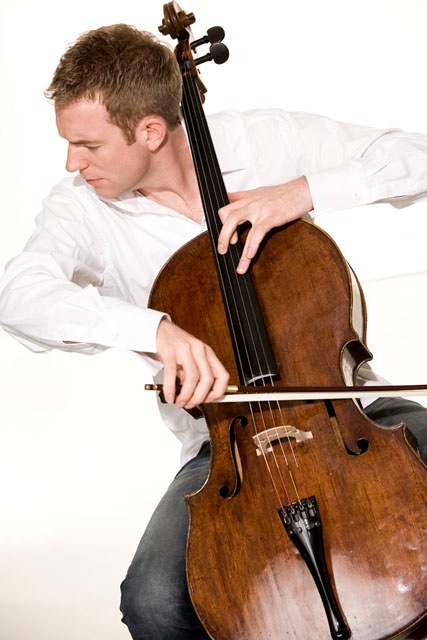Moser and Polonsky prove worthy partners in Shriver Hall recital

Johannes Moser performed Sunday evening at Shriver Hall.
The last gasp of winter shut down the Johns Hopkins University campus last Sunday, forcing the cancellation of Johannes Moser’s recital at Shriver Hall. The German-Canadian cellist, last heard with the National Symphony Orchestra in 2016, came back to Baltimore this Sunday to perform almost the same program. Although the originally scheduled pianist, Till Fellner, was not available, Anna Polonsky graciously agreed to take his place.
Moser opened with the only change to the program, Prokofiev’s Cello Sonata in C Major, which replaced Stravinsky’s Suite Italienne. With rasping tone on the lower strings and aggressive pizzicato chords, Moser attacked the first movement forcefully. Polonsky partnered him with a delicate touch, hitting just the right balance of sound in the more tender second theme, like a longing melody from one of the composer’s ballets.
Playful plucked notes from Moser punctuated the second movement, a sardonic dance, contrasted by a dreamy middle section, which again displayed Polonsky’s sensitivity at the keyboard. The finale proceeded with madcap cheerfulness, but the impassioned, slow serenade in the middle of the movement provoked some minor issues of intonation, generally at the higher portions of the A string.
Moser and Polonsky offered a quirky double rendition of Webern’s Three Little Pieces for Cello and Piano, aphorisms of dissonance and dynamic details that take only two minutes to perform. The duo played the piece twice, in the middle position of both halves of the program, offered by Moser as a bridge to the enigmatic, compressed style of the two late Beethoven cello sonatas that followed it.
On the first half, that was the Cello Sonata in C Major, Op. 102, no. 1. In the Andante opening section, Moser and Polonsky approached it in an understated way much like the Webern, giving each note a different character. The second movement’s Adagio introduction was a dark, chromatic morass, following by a sweet Andante theme that rose up from it. The contrapuntal Vivace conclusion, with several stops and starts in the score, had a playful Haydnesque quality.
The companion Cello Sonata in D major, Op. 102, no. 2, followed the Webern in the second half. Its first movement began in an unsettled way, the two musicians seeming to settle into the music more on the repeat of the first section. Moser tended to overdo loud strokes, losing the center of the pitch, including in quick staccato passages.
The second movement, an emotion-drenched Adagio, seemed distant at first, gaining interest in the more complicated passages in the middle. The musicians gave a sweet, composed feeling to the concluding Allegro fugato, the fugal process signifying completion and resolution, as it does in much of Beethoven’s late music.
Parallel to the Prokofiev on the second half was the most accomplished performance of the evening, Debussy’s Cello Sonata. One of the instrumental sonatas from the last couple years of the composer’s life, the piece is a marvel of concision, burgeoning in musical ideas and technical challenges. The performers drew from the score a series of understated vignettes: a dreamy and ecstatic introduction, a puckish serenade, and a mercurial romp.
Two encores from the young Anton Webern, Two Pieces for Cello and Piano, tied up the concert with a bow. Played in reverse order, these brief bonbons captured the arch-romantic longings of the 16-year-old composer, as arranged by cellist Gregor Piatigorsky. Webern was apparently always laconic in expression, just with a sweeter harmonic vocabulary in these examples of juvenilia.
With this recital the esteemed concert series finally returned to its home at Shriver Hall, after a year and a half of renovation to the building. The changes, although welcome, are mostly cosmetic: brighter lighting on the stage, new carpets, and slightly more comfortable seats, if not more legroom between rows. The acoustic remains warm and clear, although the doors into the auditorium should be made quieter if they are to be opened during a performance.
Clarinetist and composer Jörg Widmann joins the Hagen Quartet for music by Dvořák, Widmann, and Mozart 5:30 p.m. March 24. shriverconcerts.org; 410-516-7164

